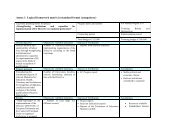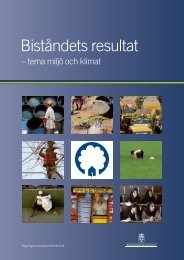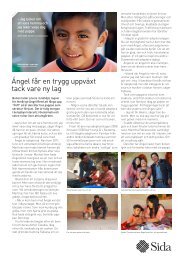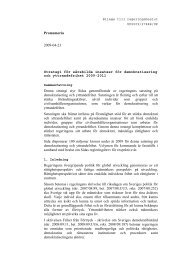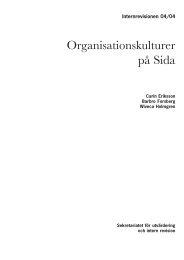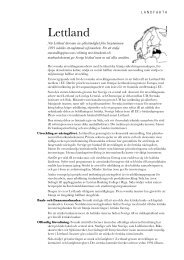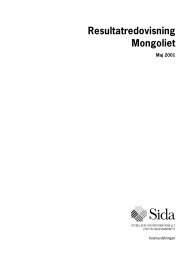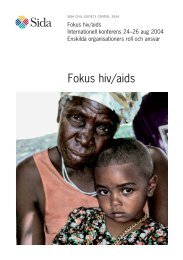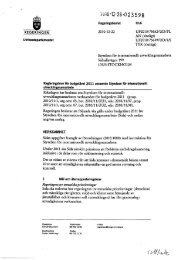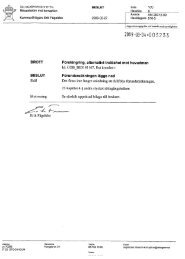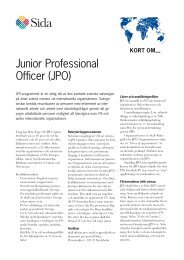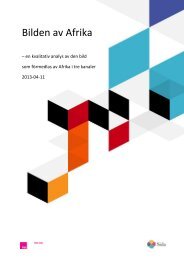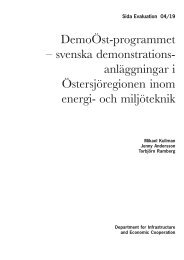Mid-Term Review of the AGIR Programme - Sida
Mid-Term Review of the AGIR Programme - Sida
Mid-Term Review of the AGIR Programme - Sida
Create successful ePaper yourself
Turn your PDF publications into a flip-book with our unique Google optimized e-Paper software.
2 F I N D I N G S<br />
(OE) tried to work with o<strong>the</strong>r organisations on <strong>the</strong> revision <strong>of</strong> <strong>the</strong> constitution, but<br />
this was unsuccessful. There have been some networking initiatives though, for example,<br />
during <strong>the</strong> by-election <strong>of</strong> Inhambane, when OE worked with CODD (an IBIS<br />
partner), which helped in turning <strong>the</strong> Electoral Observation data into a more journalistic<br />
form <strong>of</strong> information for easier access by <strong>the</strong> public. Studies about <strong>the</strong> transparency<br />
<strong>of</strong> <strong>the</strong> extractive industries in Mozambique, based on contributions <strong>of</strong> various organisations,<br />
contributed to training sessions and joint meetings. The lack <strong>of</strong> a clear<br />
mechanism for partnership is also perceived as an obstacle to more effective partnership.<br />
For example, <strong>the</strong> Electoral Observatory (OE) tried to work with o<strong>the</strong>r organisations<br />
on <strong>the</strong> revision <strong>of</strong> <strong>the</strong> constitution, but this was unsuccessful. There have been<br />
some networking initiatives though, for example, during <strong>the</strong> by-election <strong>of</strong> Inhambane,<br />
when OE worked with CODD (an IBIS partner), which helped in turning <strong>the</strong> Electoral<br />
Observation data into a more journalistic form <strong>of</strong> information for easier access<br />
by <strong>the</strong> public. Studies about <strong>the</strong> transparency <strong>of</strong> <strong>the</strong> extractive industries in Mozambique,<br />
based on contributions <strong>of</strong> various organisations, contributed turning CIP into a<br />
reference organisation in this field, with <strong>the</strong> Regional Secretariat <strong>of</strong> <strong>the</strong> Extractive<br />
Industries Transparency Initiative (EITI) discussing with this organisation <strong>the</strong> preparation<br />
<strong>of</strong> future country reports in this area.<br />
In 2012 however, some horizontal cross-<strong>the</strong>matic issue-based linkages have been<br />
streng<strong>the</strong>ned. LDH, AAAJC, and JA (Environmental Organisation) have consolidated<br />
<strong>the</strong> articulation in relation to <strong>the</strong> movement <strong>of</strong> people affected by <strong>the</strong> Brazilian mining<br />
company Vale (exploiting <strong>the</strong> coal mines <strong>of</strong> Moatize in Tete) at <strong>the</strong> International<br />
Social Forum. A strong campaign by <strong>AGIR</strong> partners JustiçaAmbiental, Livaningo<br />
(Environmental Organisation), LDH, Centro Terra Viva, Kulima, and Centro de IntegridadePública<br />
started in 2010 against <strong>the</strong> establishment <strong>of</strong> a polluting ‘bypass’ at<br />
<strong>the</strong> Mozal aluminum smelter plant that has resulted in a case against IFC (International<br />
Finance Corporation) under <strong>the</strong> World Bank Group through <strong>the</strong> Office <strong>of</strong> <strong>the</strong><br />
Compliance Advisor/Ombudsman. According to <strong>the</strong> ombudsman’s appraisal in July<br />
2012, a compliance audit <strong>of</strong> IFC must be implemented and envisaged to be conducted<br />
before end 2012.<br />
Four <strong>AGIR</strong> partners - LDH, JA, AAAJC and UNAC have recently, in an open letter,<br />
protested against <strong>the</strong> injustice and violation <strong>of</strong> human rights related to <strong>the</strong> resettlement<br />
process. International attention and <strong>the</strong> substantial involvement <strong>of</strong> international<br />
CSOs on extractive industries issues (e.g. Human Rights Watch, and <strong>the</strong> Movement<br />
<strong>of</strong> People Affected by Vale), reinforces advocacy processes. While <strong>the</strong>se strong advocacy<br />
processes cannot be directly attributed to <strong>AGIR</strong> (and are likely to have happened<br />
without <strong>the</strong> participation <strong>of</strong> <strong>AGIR</strong>), <strong>the</strong> programme’s partner CSOs are contributing<br />
to this process.<br />
A similarly strong advocacy process was conducted by <strong>AGIR</strong> partners Forum Mulher,<br />
WLSA and Nwety and o<strong>the</strong>r CSOs, resulting in <strong>the</strong> effective implementation <strong>of</strong><br />
<strong>the</strong> Law on domestic violence. These are examples <strong>of</strong> how interventions have improved<br />
and led to results in advocacy networks due to better <strong>the</strong>matic articulation, <strong>the</strong><br />
50



